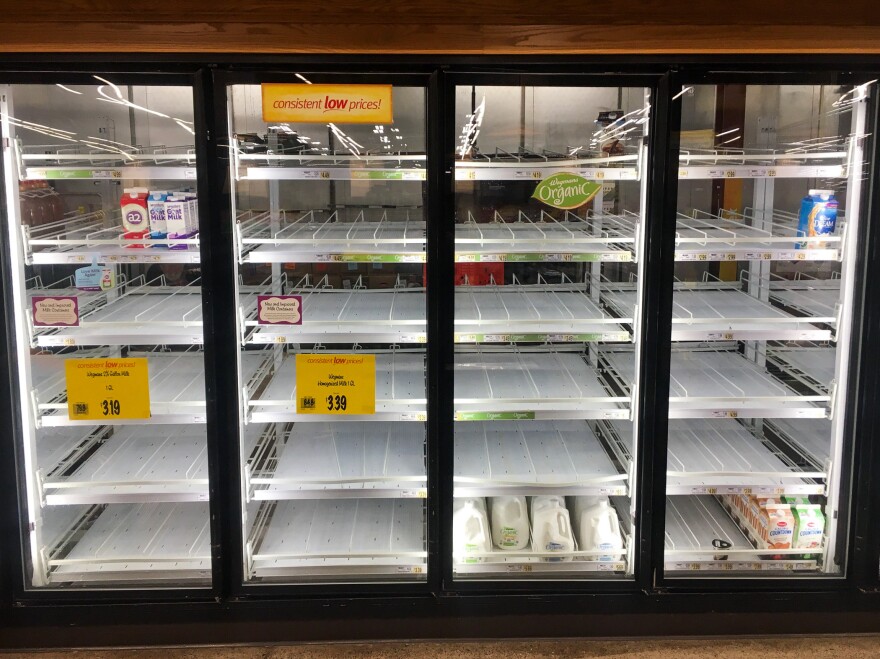Alisha Risser, the owner of a small dairy farm in Lebanon County has been milking cows for decades. But last week, for the first time ever, she had to dump more than 10,000 pounds of perfectly fine milk down a drain.
“There’s a lot of work that goes into those gallons of milk … so it’s definitely stressful to watch it go down the drain,” she said. “It was harder than I thought.”
Farmers know people across the country are also facing challenges and making sacrifices because of the COVID-19 pandemic, Risser added, but she is frustrated to see food go to waste.
The dairy processor where Risser ships her milk told her there is more milk than they can process, so she and other farmers have to dump the excess because they cannot do anything else with it. Since farmers cannot store a lot of raw milk for long without some kind of processing, this is happening at other dairy farms in Pennsylvania, New York and around the country.
This may come as a shock to those who have seen vacant dairy shelves at supermarkets in recent weeks.
How can there be too much milk right now when high demand has pushed some grocery stores to ration the amount the number of cartons people can buy?
There are a few factors: Some plants that process milk for grocery stores are maxed out, while others that process specialty items have cut back. And, at the same time, demand is down among typically large buyers of dairy products, such as restaurants, hotels and school districts.
In 2010, Americans spent more money eating out than eating at home for the first time — a trend that’s continued through at least 2017, according to a 2018 report from the U.S. Department of Agriculture Economic Research Service.
When states issued stay-at-home orders because of the COVID-19 pandemic, restaurants, hotels, diners, food trucks and cafeterias started serving food to fewer people, which means less demand for milk to make ice-cream, cheese, sauces, butter pats and other dairy-related food or condiments for people eating out.

“Milk sales in the grocery store were up 30% this March compared to the same time period last year, which on paper would be good for the dairy industry,” said Emily Barge, the spokesperson for the Center for Dairy Excellence, a nonprofit in Pennsylvania that supports the dairy industry. “It’s not enough to counter the huge decline in sales at the restaurant and food service level.”
Barge explained that a plant that processes and bottles milk for grocery stores might be working at full capacity, but other plants that process, say, specialty cheeses, might not be getting a lot of business, and it is neither easy nor quick for plants to make a different product on short notice.
Michael Mattson, a dairy farmer in New York who also had to dump milk, said his supply usually goes to two processing plants in New Jersey that make specialty cheeses. One of those plants was shut down, and the other curtailed production due to a lack of demand.
“Milk is something that needs to flow everyday. It can’t stop, it can’t be stored very long without being processed somehow,’ Mattson said, adding that farmers also cannot just stop milking dairy cows. “You can’t shut them off, you can’t turn them down, you can’t say, ‘Ok, we’re going to take a day off.’”
Mattson and Risser both say it’s too early to tell how the COVID-19 pandemic will affect business for their farms. The dairy industry has been struggling in recent years, with Americans drinking less liquid milk and milk prices falling.
There are regular dry periods when dairy cows are not milked. But once a cow is being milked, to stop milking them means making the cows uncomfortable or possibly infected.
There are limited options for dairy farmers hoping to circumvent the pasteurization process and sell raw milk directly. New Jersey and Delaware do not allow farms to sell raw milk to the public, which the Centers for Disease Control and Prevention says can pose a severe health threat. Pennsylvania does allow raw milk sales, but farms have to get a permit, which can be difficult for small farms.
Read more from our partners, Keystone Crossroads.




